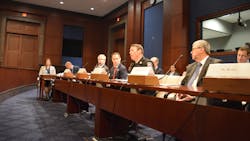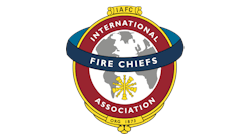IAFC Promotes Pipeline/Hazmat Response Training
Chantilly, Va. -- IAFC President Dan Eggleston recently told a House of Representatives panel that an effective response to a pipeline/hazmat incident requires pipeline operators, local fire departments and other state and local officials to work together. This cooperation, Eggleston testified, cannot start on the day of the incident. It requires the public and private sector to plan, train, exercise and equip themselves beforehand.
Eggleston testified before the House Subcommittee on Railroads, Pipelines, and Hazardous Materials of the Transportation and Infrastructure Committee, chaired by Rep. Dan Lipinski (D-Ill.).
Eggleston said overall, the use of pipelines is one of the safest ways to transport hazardous materials across the nation. However, when accidents occur, local emergency responders must be prepared, trained and equipped to respond.
"An effective response requires pipeline operators, local fire departments, and other state and local officials to work together," Eggleston said. "This cooperation cannot start on the day of the incident. It requires the public and private sector to plan, train, exercise and equip themselves beforehand."
Eggleston testified that as the committee examines reauthorization of pipeline safety programs at the Pipeline and Hazardous Materials Safety Administration, the IAFC recommends that the committee consider the following actions:
- Promote coordination between local authorities and pipeline operators. Local Emergency Planning Committees are designed to bring together industry officials, local emergency responders and other affected stakeholders to plan and exercise for potential pipeline and other hazmat incidents. Currently, there are 3,000 known LEPCs around the nation. However, it is unclear how many of these LEPCs are active.
- Support training and exercise programs that bring stakeholders together. Pipeline operators and local emergency responders should develop emergency response plans ahead of time. They also should meet regularly and exercise them throughout the year.
- Support funding for equipment and staffing for local fire departments. Fire departments -- especially in rural areas -- may not have the equipment needed to respond to a complex incident like a pipeline rupture. The Assistance to Firefighters Grant program provides matching grants for local fire departments to purchase the necessary equipment for pipeline incidents and all other hazards. The SAFER grant program provides matching grants for both hiring firefighters and recruiting volunteers to help staff fire departments in communities bordering pipelines. We appreciate the continued support Congress has shown these programs and ask that each be funded at $405 million for FY 2020.
Read the full testimony (PDF).
About the International Association of Fire Chiefs (IAFC)
The IAFC represents the leadership of firefighters and emergency responders worldwide. IAFC members are the world's leading experts in firefighting, emergency medical services, terrorism response, hazardous materials spills, natural disasters, search and rescue, and public safety legislation. Since 1873, the IAFC has provided a forum for its members to exchange ideas, develop professionally and uncover the latest products and services available to first responders. Learn more







